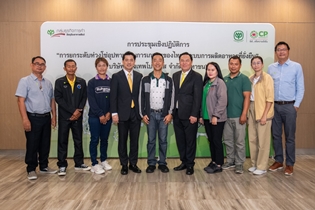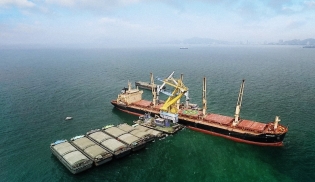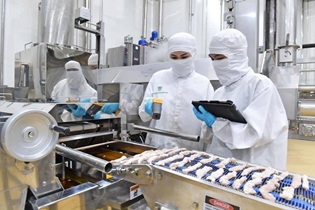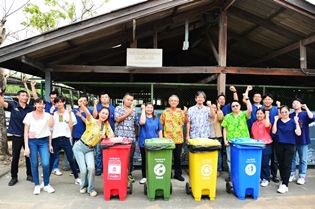

Charoen Pokphand Foods PLC (CPF) strives to maximize the value of water resources, applying technology to reduce water usage throughout the production process along with recycling to reduce demand for raw water. Meanwhile, its livestock farms stand ready to share water with farmers, to ease their suffering amid drought.
Mr. Prasit Boondoungprasert, Chief Executive Officer of CPF, said CPF realizes the significance of water as it is the most important production factor of the agricultural and industrial sectors. CPF adopts thorough water management throughout the production chain for maximum benefits, as guided by the eco-efficiency concept, to balance business growth and ecosystem conservation. The goal is to reduce environmental impacts and concurrently reduce demand for raw water.
CPF targets to reduce raw water consumption by 25% in 2020 and 30% in 2035. Three sustainable water management approaches are being exercised: 1) Annual assessment of water shortage using the tools of Aqueduct, an international organization that identifies and evaluates water risks around the world 2) Recycling and 3) Release treated water from livestock farms and processing plants to nearby communities and farmers to help relieve drought impacts.
CPF and suppliers’ water risk assessment data will help address drought impacts being felt by communities, while water recycling is to make the best use of water. In 2018, 28 million cubic meters or 18% of CPF’s raw water intake was treated and reused. That allowed CPF to reduce raw water intake for the production process by 32% from the 2015 base year.
“We have required all business units to follow this policy. They must maximize natural resource management and release treated water to communities and factories located around the Company’s premises,” Mr. Prasit said.
In 2018, CPF’s shrimp farms reduced water usage by 23 million cubic meters due to the improvement of farming techniques and recycling technology that recycled water from farm houses for other purposes and released no water to the environment (zero discharge). Such reduced demand for water from external sources by 70-75%, compared to traditional farming. Biofloc Technology was deployed to handle waste in the ponds, reducing the water change frequency. In the farming cycle, water usage decreased to only 1.5 cubic meters per 1 kg of shrimp compared to 5 cubic meters consumed by traditional farms.
Swine and chicken farms save water by following the dietary and usage standards designed for each animal while water pipes are kept in perfect condition. In 2018, 380,000 cubic meters of treated water were released to nearby farms, covering a total of 3,650 rai. Water from swine farm houses goes to biogas digesters, to generate methane-gas renewable energy for internal use. Treated water contains mineral nutrients – nitrogen, phosphorus and potassium, being natural fertilizers for sugar cane and tapioca grown around the farms. It helps farmers reduce demand for natural water and save fertilizer costs.
Mr. Prasit added that CPF also emphasized the rehabilitation of Khao Phraya Doen Thong in Lop Buri province, the upstream water source of Pasak River, as fertile forests will increase moisture and water in Pasak Dam and sustainably maintain natural balance.
Another goal of CPF is to become a low-carbon organization, with the target to reduce greenhouse gases by 25% in 2025 from the 2015 base year. GHG reduction in production process and product lifecycles are in focus. For instance, renewable energy from 25 biogas projects, biomass projects and solar rooftop projects is powering its operations. Together with environmental-friendly pig food innovation, these projects help reduce carbon dioxide emissions by 522,000 tons per annum on average. In 2019, renewable energy increased to 25% of total energy consumption.
CPF also adopts the “neutral carbon” approach in its charity run CSR project, starting in 2020. Under this approach, GHG emissions from energy consumed throughout the activity period, participants’ travel, as well as food and drinks will be compensated by the carbon credits of 560 tons of CO2 equivalent earned under Thailand Voluntary Emission Reduction Program (T-VER). On top of that, this project aims for zero waste.









